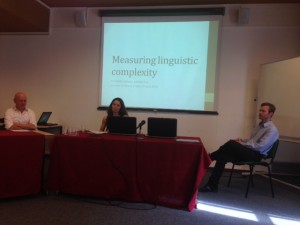LCR 2015 Call for Papers
@LCR2015
Following the successful initial conference in Louvain-la-Neuve (Belgium) in 2011, and the second conference in Bergen (Norway) in 2013, the third conference in this biannual series will be hosted by Radboud University Nijmegen, the Netherlands, from September 11-13, 2015. See the conference
website http://www.ru.nl/lcr2015/ for more details.
The conference is organized under the aegis of the Learner Corpus Association
Conference Venue
Van der Valk Hotel Cuijk – Nijmegenhttp://www.hotelcuijk.nl/en
Organising committee
Pieter de Haan
Rina de Vries
Sanne van Vuuren
Ans van Kemenade
Jacqueline Berns
Programme committee chairs
Marcus Callies (Universität Bremen)
María Belén Díez-Bedmar (Universidade de Jaén)
Gaëtanelle Gilquin (Université catholique de Louvain)
Hilde Hasselgård (Universitetet i Oslo)
Signe Oksefjell Ebeling (Universitetet i Oslo)
Confirmed keynote speakers
Kees de Bot (Rijksuniversiteit Groningen)
Barbara Seidlhofer (Universität Wien)
Janine Treffers-Daller (University of Reading)
We welcome papers that address all aspects of learner corpus research, in particular the following ones:
– Corpora as pedagogical resources
– Corpus based transfer studies
– Data mining and other explorative approaches to learner corpora
– English as a Lingua Franca
– Error detection and correction of learner language
– Extracting language features from learner corpora
– Innovative annotations in learner corpora
– Language for academic / specific purposes
– Language varieties
– Learner corpora for less commonly taught languages
– Learner Corpus Research and the Common European Framework of Reference
for Languages (CEFR)
– Links between learner corpus research and other research methodologies
(e.g. experimental methods)
– Search engines for learner corpora
– Statistical methods in learner corpus studies
– Task and learner variables
There will be three different categories of presentation:
– Full paper (20 minutes + 10 minutes for discussion)
– Work in Progress (WiP) report (10 minutes + 5 minutes for discussion)
– Corpus/software demonstration
– Poster
The Work in Progress reports and posters are intended to present research still at a preliminary stage and on which researchers would like to get feedback. The conference aims to be a showcase for the latest developments in the field and will feature both software demos and a book exhibition.
The language of the conference is English.
Abstracts
Your abstract should be between 600 and 700 words (excluding a list of references). Abstracts should typically provide the following:
– a clearly articulated research question and its relevance;
– the most important details about research approach, data and methods;
– the main results and their interpretation.
Abstracts should be submitted through EasyChair
https://easychair.org/conferences/?conf=lcr2015 by 31 January 2015.
Please follow instructions provided on the conference website.
Abstracts will be reviewed anonymously by the programme committee.
Notification of the outcome of the review process will be sent by 15 March 2015.




